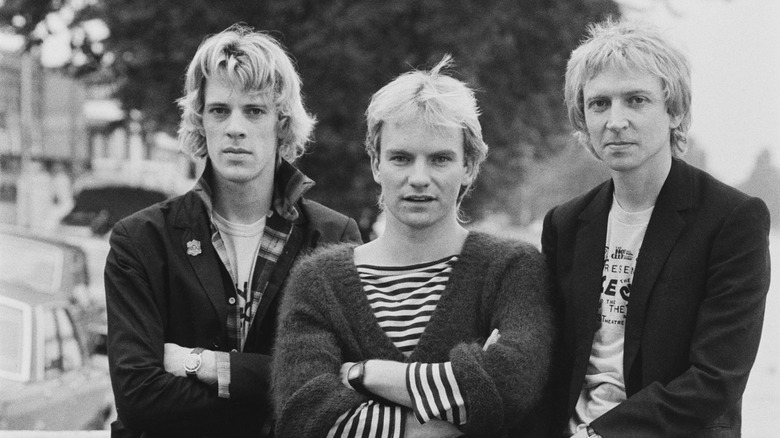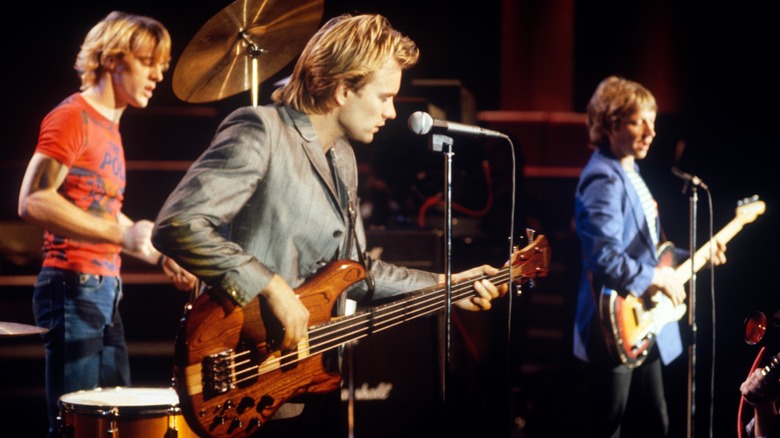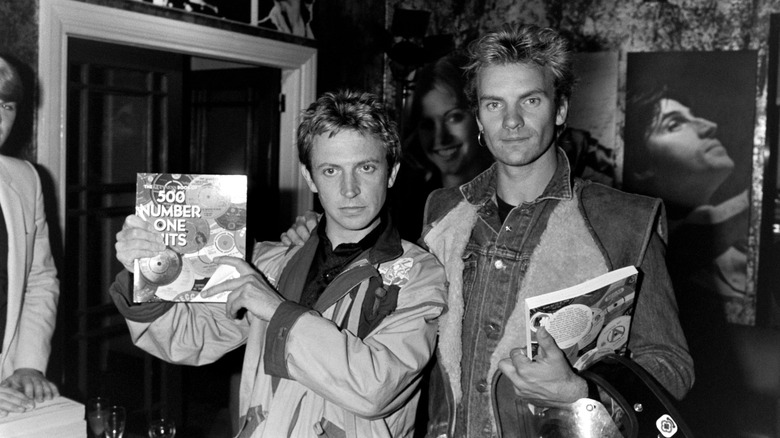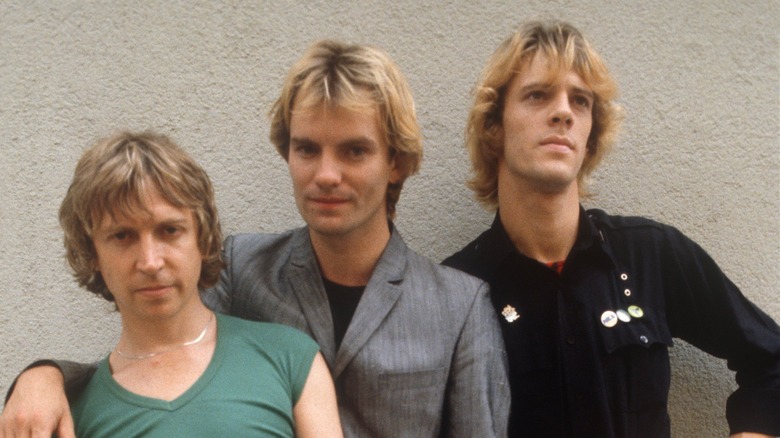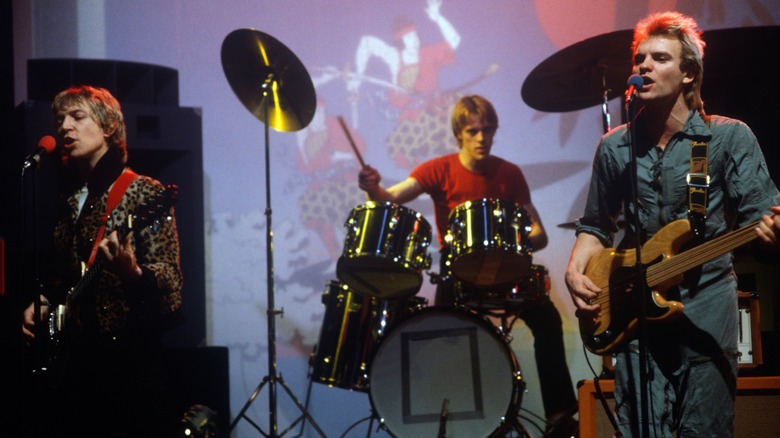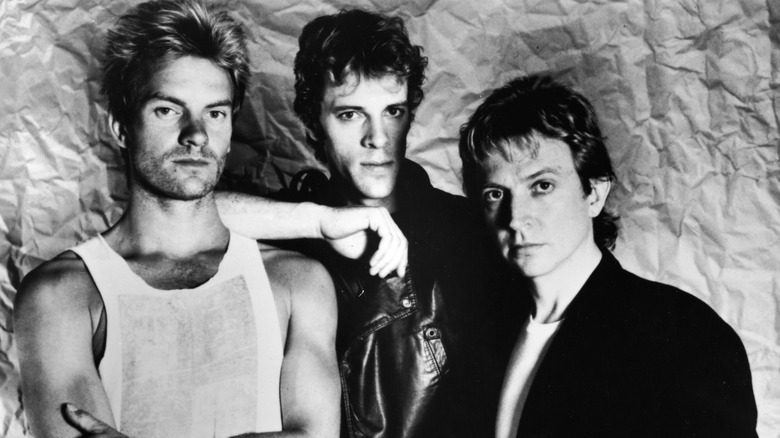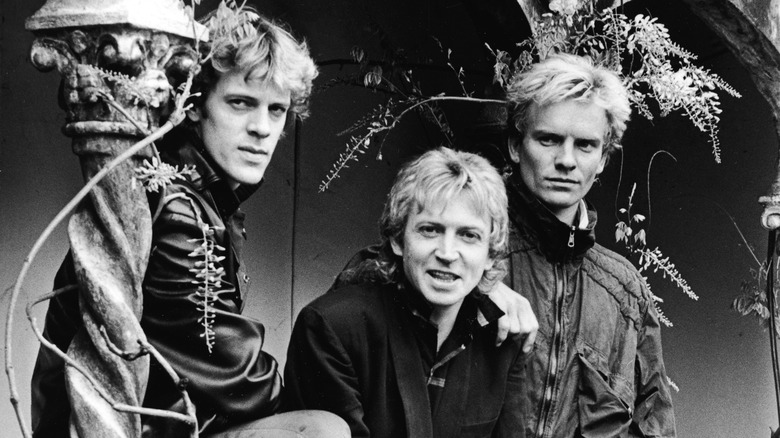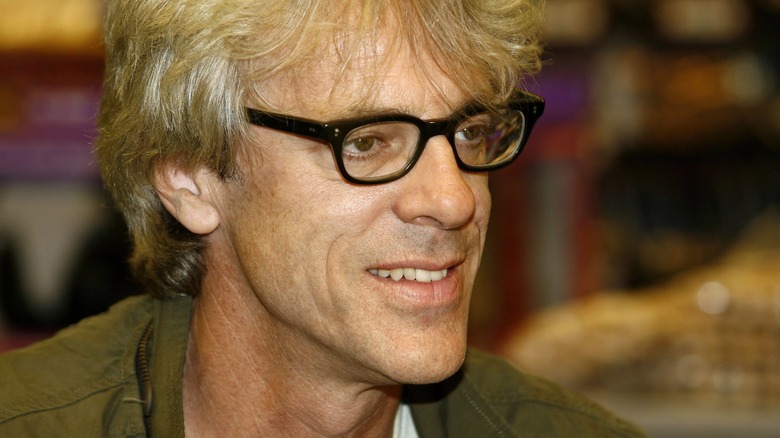The Untold Truth Of The Police
The three-piece English rock band The Police formed in 1977 and featured a reggae influence during a time when punk rock dominated England. The band released its first album, "Outlandos d'Amour," with very little money and no record contract, according to 8Notes.com. The group eventually signed with A&M Records and, before long, became huge in England as well as the United States. They toured the world in 1980 and dropped their fifth and final album, "Synchronicity," in 1983 before calling it quits the following year.
The three men parted ways and pursued solo projects. They reunited in 2007 and 2008 for another tour, which Sting labeled "an exercise in nostalgia" during a 2021 interview, according to Music News. He noted that he liked being a solo artist because when you're in a band, the music is a collaborative process, and "you have to consider other people almost more than you do yourself." He added that being a solo artist grants one "total career freedom."
Will they reunite again? Steward Copeland said in a 2020 interview with Classic Pop that he would be surprised if somebody didn't have thoughts about another reunion; however, he pointed out that "it's certainly not what anyone is thinking about now." And with Sting so hung up on the freedom of his solo work, it's hard to say whether The Police will ever reconvene. Here are some interesting facts about the group and their highly successful yet short-lived career as a three-man band.
Each member had different musical backgrounds
There were only three members of The Police: Sting, Stewart Copeland, and Andy Summers. The trio was a mix of reggae-inspired sounds along with pop rock and a little bit of punk rock, a combination that turned them into one of the world's most popular rock bands. Before joining The Police, Summers played with the psychedelic group Soft Machine, folk rocker Kevin Coyne, and progressive rocker Kevin Ayers, according to the guitarist's website. Drummer Copeland played with the progressive rockers Curved Air and then joined The Police after that band broke up, according to AllMusic. Vocalist and bassist Sting, meanwhile, was big into jazz fusion before forming The Police.
Born Gordon Sumner, Sting was a teacher at St. Paul's First School in Cramlington, and playing bass was his side gig. He worked with the Newcastle Big Band and the Phoenix Jazzmen. Since he had a penchant for wearing yellow and black sweaters, Gordon Solomon from the Phoenix Jazzman started calling him Sting, which stuck, per AllMusic. In 1975, Sting's band Last Exit broke up, and he turned to Copeland to form a band. They originally worked with guitarist Henri Padovani before adding Summers to the lineup. They were a foursome for a short time until Summers requested that he be the only guitarist in summer 1977.
The Police parted ways at the peak of their popularity
The Police started working on what would become their most successful album, "Synchronicity," in 1982. They got together with producer Hugh Padgham in Montserrat, each with their own material. Sting explained in the album's liner notes: "I think we'd become so refined as a group of musicians that we realized that the three instruments just playing solo and ensemble was perhaps the best way of doing it — and it just seemed to happen." He added that the songs worked well with three instruments but, even with overdubbing had, a "spartan" feel.
The album was a chart-topper in the United States and United Kingdom. During one performance at Shea Stadium in front of 70,000 fans, Sting had a moment of enlightenment, understanding that The Police was at the top of its game. Less than a year later, they split up despite being at the height of their popularity. In a 2015 interview with the Mirror, Stewart Copeland explained that the camaraderie they once shared was no longer there. "We were being bombarded by everything and we were confused so we said, 'Let's just break up — that's a great idea'. Then the reality of it struck and we realized it was a terrible mistake." In hindsight, he thinks they should have simply taken some time off and reunited.
Ego led to the band's breakup
While promoting the documentary "Can't Stand Losing You: Surviving the Police" based on Andy Summers' 2006 memoir, "One Train Later," the guitarist explained how the band was a family that loved one another and shared an incredible bond. He credited their success to the blending of their musical prowess and Sting's voice, according to the Star Tribune. Unfortunately, their eventual success and subsequent ego created problems over the years, and their joint decision-making had transformed into a "dictatorship."
For example, Summers specifically noted in the documentary that Sting didn't want to play on the instrumental song "Behind My Camel" from the album "Zenyatta Mondatta." After Summers recorded the parts, he accused Sting of hiding the tapes. Summers noted in retrospect that each of the members wanted a piece of the pie, which is a challenge when there are three individuals involved. While it may seem like Summers was attacking Sting, the singer and Copeland "signed off" on the documentary.
Summers added that by their fourth album, "Ghost in the Machine," trouble was brewing. "The ego was starting to come up between all of us ... it was the beginning of the end, as it were," he explained. When they reunited over 20 years later, though, the band's tour was very successful.
The band dyed their hair blond for a very unlikely reason
Sting, Stewart Copeland, and Andy Summers were actually brunettes early on their careers. Yet, they decided to make a drastic change to their image not long after forming The Police in 1977. According to the rock radio morning show "Lamont & Tonelli," the trio dyed their hair blond after being recruited to star in a commercial for Wrigley's gum. The company felt that blond locks created a more punk feel than the band's natural hues. In 1978, The Police was still a relatively new band and needed a paycheck, so they were persuaded to change their look.
Years later, Summers told BlogTalkRadio.com, "We needed the money. There's a shot of us carrying a six-foot-long packet of Wrigleys across the room. The crazy thing is we go on to become the biggest band in the world, and they never used the ad! I wonder if we could contact Wrigley now and find it in their archives."
Stuart Copeland's father was a CIA agent
Stewart Copeland's dad, Miles, was born in Birmingham, Alabama, and was an intelligence agent for the United States during World War II. He married a Scottish intelligence agent, and after the war ended, he was recruited by the CIA and sent to Syria, according to The Guardian. Stewart was born in 1952 in Virginia but grew up in Beirut and Cairo. He and his siblings were unaware of their father's actual job until much later in life. Miles left the CIA in 1957 and wrote a book, "The Game of Nations: The Amorality of Power Politics," in 1969, that explained a bit about his post-war activities.
In 1986, Miles was interviewed by Rolling Stone and indicated that The Police were a psychological operations group that influenced young minds. Stewart recalled that the comment irritated Sting: "He knew my father very well, and he regrets it now but he took adversely the suggestion that he was a CIA pawn." Stewart attempted to make a movie about his father, but he was turned off when investors wanted the storyline to feature The Police. Instead, he created a podcast for Audible. He has revealed that he wasn't upset when he learned the truth about his dad's work for the agency. He remembers him as a "very jocular, cheerful, witty, charming man."
The champion race horse Zenyatta was named after a Police album
After a grueling world tour following the release of "Reggatta de Blanc," The Police returned to the studio just two months later in 1980 to record another album. "Zenyatta Mondatta" included two big hits, "Don't Stand So Close to Me" and "De Do Do Do, De Da Da Da." The trio finished the album the day they started back on tour. And while Sting considered it a flawed project, it made the group even more popular than ever, reports The Police website. According to Stewart Copeland, the title did not have a special meaning. He explained, "You can interpret it in a lot of different ways. It's not an attempt to be mysterious, just syllables that sound good together, like the sound of a melody that has no words at all has a meaning."
The album obviously left a big impression on people. The thoroughbred Zenyatta was even named after it, according to America's Best Racing. The horse holds the record "for most consecutive victories in the modern era in races not restricted to state-breds." She has a career record of 19 wins and one second. In 2009 and 2010, Zenyatta was a runner-up in the Associated Press' Female Athlete of the Year list but lost to tennis ace Serena Williams and skier Lindsey Vonn.
The song Roxanne was initially a flop
In 1977, The Police were killing time after a cancelled show in Paris when Sting wandered around the city and noticed several sex workers hanging out in an alleyway. The hotel he stayed in featured a poster from "Cyrano de Bergerac," and a song started coming together. Sting chose the name "Roxanne," for the character whom Cyrano desired in the play. "I had a tune going around in my head, and I imagined being in love with one of those girls," Sting recalled, according to Louder. Since the band didn't have a lot of material, they ran with it and wrote the tune in one day.
A&M ended up releasing the single in April 1978, but it fell flat. The BBC blocked "Roxanne" from its playlist, and the song went nowhere. Sting was annoyed, saying later that year, "It was a real song with a real, felt lyric, and they wouldn't play it on the grounds that it was about a prostitute." However, when The Police toured America in 1979, radio stations picked up on it and started playing it regularly. "Roxanne" became the band's first big international hit, and today it's one of their signature songs.
Don't Stand So Close to Me was inspired by 'sexuality in the classroom'
"Don't Stand So Close to Me," which appeared on the album "Zenyatta Mondatta," was a top 10 song in 12 countries when it was released in 1980, according to Ultimate Classic Rock. Sting, a former teacher, wrote the song, which centered on a relationship between a teacher and one of his students. Sting provided some background on the tune in the book "L'Historia Bandido," explaining that the notion of "sexuality in the classroom" inspired him, particularly since he once taught teenage girls. He was also inspired by the book "Lolita."
In a comment that's certainly not politically correct by today's standards, Sting reportedly explained that he had been the subject of desire for 15-year-old girls, and the feelings were reciprocal, although he didn't act on it. "How I kept my hands off them I don't know," he said. To make it clear, he has stressed over the years that he never acted inappropriately with any of his students, telling Q in the '90s that the song took advantage of his role as a rock star: "You have to remember we were blond bombshells at the time and most of our fans were young girls, so I started role playing a bit."
Can't Stand Losing You is about suicide
"Can't Stand Losing You" appeared on The Police's first album, "Outlandos d'Amour." The song is about a teenage boy who takes his own life after his girlfriend leaves him. Sting has confirmed that the tune is about teen suicide and claims it took him only a few minutes to write. Lyrics include: "You can call it lack of confidence / But to carry on living doesn't make no sense." According to Song Meanings and Facts, the original artwork for the song features drummer Stewart Copeland with a noose around his neck. He is standing on a block of ice. Obviously, when the ice melts, the noose will tighten and cut off his air supply, thus killing him.
"Can't Stand Losing You" became The Police's first hit song, and it was their second single. It was released in August 1978 and then again in 1979, when it hit No. 2 on the U.K. Singles Chart. The first single the band released? "Roxanne." Copeland claimed "Can't Stand Losing You" helped set up the band's signature sound, according to Song Facts.
If you or anyone you know is having suicidal thoughts, please call the National Suicide Prevention Lifeline at 1-800-273-TALK (8255).
Every Little Thing Is Magic was criticized for not being commercial enough
"Every Little Thing She Does Is Magic" wasn't released until The Police's fourth album, "Ghost in the Machine," even though Sting had written the song several years earlier after moving to London from Newcastle, according to Song Facts. At the time, the vocalist was poor, looking for a place to live, and getting ready to reach out to Stewart Copeland for a collaboration. When he sang the song at the Zanzibar in Convent Garden during an audition, he was told, "We need commercial hit songs. We don't need this kind of stuff."
Little did that guy at the Zanzibar know that "Every Little Thing She Does Is Magic" would go on to win the Best Pop Song at the Ivor Novello Awards in 1982. It hit No. 1 in the United Kingdom and No. 3 in the United States and is considered one of the group's most popular songs, according to Song Meanings and Facts. The tune may seem like a sweet love song on the surface, but it's about a lonely man fantasizing about a relationship. He has stalker tendencies as he vows to call this woman "a thousand times a day."
The reason why it was included on "Ghost in the Machine" was to "leaven the rather sober tone of the rest of the record," according to Sting.
Sting made his acting debut in the film Quadrophenia
In 1979, when "Roxanne" was a top 40 hit in the United States and Canada, Sting appeared in his first film, according to Britannica. He played a minor role in "Quadrophenia," a movie about a young man named Jimmy who wants to join a gang called the Mods and be like their leader, Ace Face, played by Sting, according to Rotten Tomatoes. Sting was busy with The Police for the next few years but showed up again on the big screen the same year the band disbanded. In 1984, he appeared in "Dune." Interestingly, his co-star Patrick Stewart had no idea who he was when he met the singer.
Stewart realized Sting was famous by the way people reacted to him on set. He asked Sting if he was a solo artist, and when he said he was in The Police, the out-of-touch Stewart responded, "You play in a police band?" Stewart also claimed that filmmaker David Lynch inadvertently cast Sting in the sci-fi epic but has never revealed any details on how that happened, according to The Hollywood Reporter. The singer acted again in the 1988 crime drama "Stormy Monday" alongside Melanie Griffith and Tommy Lee Jones and has also appeared in a few other projects, including "Lock, Stock and Two Smoking Barrels," "Cold Mountain," and "The Bee Movie," according to Fandango.
Stewart Copeland has produced some of film's most groundbreaking musical scores
Stewart Copeland also turned to Hollywood after The Police disbanded, but he stuck to his musical expertise instead of acting. Since the mid-1980s, he has worked on almost 40 films and TV programs, according to the band's biography. He scored the music for "Wall Street" as well as "Rumblefish," ae received a Golden Globe nomination for "Four Days in September."
Copeland has also written operas and ballets composed music for productions such as the San Francisco ballet's rendition of "King Lear." In 2006, he was nominated for a Grammy for the album "Orchestralli." He has toured with a variety of musical acts and rock groups, including Trey Anastasio of Phish and Les Claypool of Primus. He also participated in the Light Up The Orchestra tour in which he played Police songs as well as film scores and other music from his repertoire. He latest project is the Police Deranged For Orchestra, which covers his four decades of work.

